Last week, Schools Week reported that the government is facing calls to review the English Baccalaureate as a measure of accountability after the Russell Group of universities ditched its list of ‘facilitating subjects’. In part, the list of subjects that make up the EBacc was based on this list of facilitating subjects.
A brief history of EBacc entry rates
The EBacc was introduced in 2011.[1] Back then, a little more than 20% of pupils entered all five components: English, maths, two sciences, a modern or ancient language and a humanity.
The first cohort to start Year 10 after the announcement of the policy began in September 2011 and reached the end of Key Stage 4 in 2013. For this cohort, we see a marked increase in EBacc entry rates, as the chart below shows.
There is then a further notable increase in the science and humanities components in 2016, but not in languages, and therefore not in the EBacc as a whole. The lack of language teachers seems to have been the biggest barrier to EBacc take-up. However, provisional entry data for 2019 suggests increased take-up of modern foreign languages.
By 2018 the overall EBacc entry rate had increased to 38%. This is some way short of the government’s ambition of 90% of pupils studying the EBacc by 2025 (and 75% by 2022). In fact, as we showed in this very old blogpost, a 38% entry rate isn’t much higher than it would have been had it been calculated back in 2005 (or earlier).
To my mind, the EBacc doesn’t seem to have caught on in schools. If the EBacc really had taken hold in schools, surely entry rates would be higher?
EBacc + Wolf + P8 = ?
The EBacc was, however, just one measure taken by the government to incentivise schools to favour certain qualifications over others through the machinery of accountability. The others were its response to the Wolf review of vocational education in 2014 and the introduction of Progress 8 in 2016.
So what is the total effect of these changes?
In short, an extra 29% of pupils are taking a GCSE in geography or history and an extra 33% are taking GCSEs in science, when comparing 2018 to 2011.
If the EBacc didn’t exist, what would they do instead?
We’ll look at three options.
1. Religious studies
Some of the increase in humanities entries may have come at the expense of religious studies.
We wrote about the curious rise of entries in GCSE religious studies after the introduction of the EBacc in 2016. However, we concluded that that was down to schools switching from the previously popular short course GCSE, which became ineligible for performance tables in 2014.
Since that post, entries in GCSE religious studies have fallen.
2. Arts subjects
Let’s start with arts subjects such as art and design, drama and music.
In this blogpost, we took issue with claims made by the government that more pupils took a GCSE in arts subject in 2015 than in 2011 when the EBacc was introduced.
This was factually correct but only told half the story. In actual fact, the increase was due to schools switching to GCSEs from equivalent qualifications following the Wolf review, rather than due to more pupils taking arts subjects.
When we looked at pupils entering any qualification in arts subject (not just GCSEs) we saw a slight decline in entry rates between 2011 and 2015.
And since 2015, entry rates in arts subjects in the qualifications the government likes have actually fallen (see Table 11 of this Department for Education publication [PDF]).
But is this down to the EBacc? I’m not so sure.
As we wrote here, entry rates in art and music have also been falling in Wales, which doesn’t have the EBacc.
Perhaps the decline in the arts is more down to budgetary pressures?
As for design and technology, entry rates have been in long-term decline since the turn of the century.
3. Alternatives to GCSE
Let’s return to the extra 33% of pupils taking two GCSEs in science in 2018 compared to 2011.
If we go back to 2011, we see that around 20% of pupils took an applied Level 2 (usually BTEC) qualification in science. A further 10-15% took other types of science qualification, including single science and entry-level qualifications.
Applied science qualifications continued to be counted in performance tables until 2016, albeit not contributing to the EBacc buckets of Progress 8. Numbers of entrants dwindled, however.
A number of teachers I’ve spoken to were very enthusiastic about applied science as an option for some pupils, particularly those who struggled with exams and the more academic content of a GCSE.
So would schools want to use alternatives to GCSEs if the EBacc didn’t exist?
If so, the thorny issue of equivalence would have to be grasped.
Applied science qualifications were over-valued in performance tables. Thomson’s Law states that if a qualification is perceived to be scored more favourably than others (particularly GCSEs), then 20-25% of pupils nationally will eventually be entered for it. This was the case not only with applied science but also with other qualifications such as GNVQs and the ECDL.
So while alternative qualifications might well be appropriate for some, the incentives to enter pupils who might be better suited to GCSE would need to be minimised.
Unfortunately, I don’t think we’ve ever got equivalence right.
Curriculum time
Perhaps the decline in arts could be due to reformed subjects taking up more curriculum time? This has been suggested by some readers as an explanation for the decline in the number of qualifications entered by pupils in 2018.
There is some evidence for this. Last week, the TES reported that in some schools, non-EBacc subjects were being delivered after school.
Research undertaken by the National Foundation for Education Research in 2017 showed that the amount of curriculum time given to the EBacc subjects increased from 55% to 65% between 2010 and 2016.
Some more research in this area would be valuable. However, it would need to try to separate out the effects of the EBacc from the effects of GCSE reforms.
In summary
It seems to me that “EBacc” is used as a shorthand for a raft of changes introduced since 2010 including the Wolf review, Progress 8 and GCSE reforms.
Moreover, these changes have occurred at a time of reduced per-pupil funding, which may well have forced schools to stop offering subjects with small classes, e.g. music.
The government could scrap its 90% EBacc target overnight but unless it also changed the three EBacc buckets of Progress 8/Attainment 8 and allowed a wider range of qualifications to be counted in performance tables then it is hard to see that much would change for pupils in schools.
Having said that, there might be less fear of failing an inspection for not having an EBacc-compliant curriculum.
Want to stay up-to-date with the latest research from FFT Education Datalab? Sign up to Datalab’s mailing list to get notifications about new blogposts, or to receive the team’s half-termly newsletter.
1. It was calculated retrospectively for 2010.



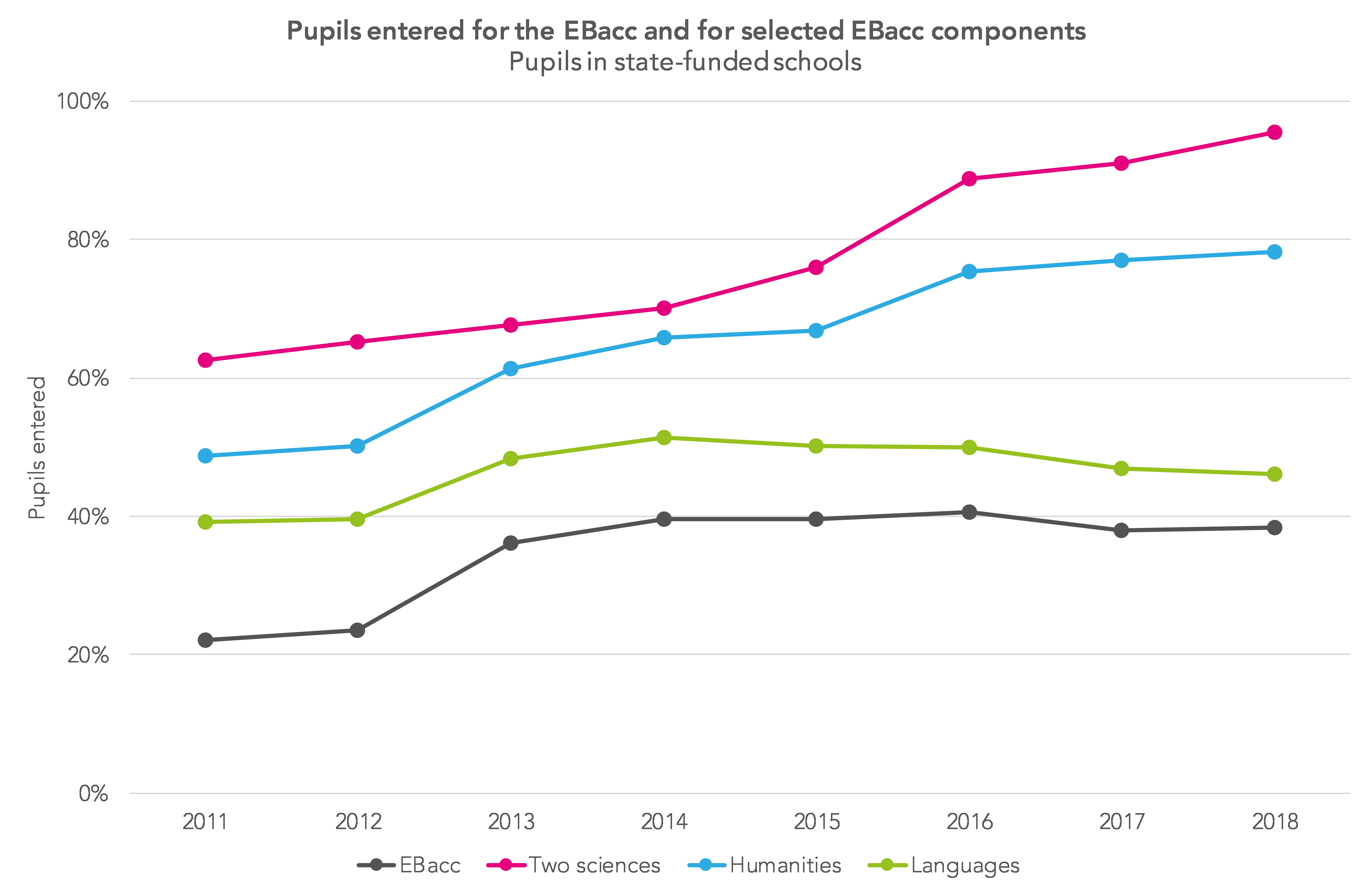
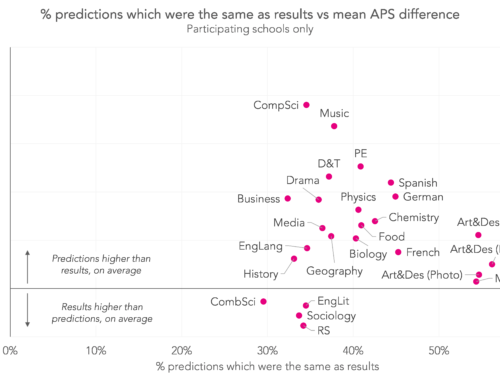

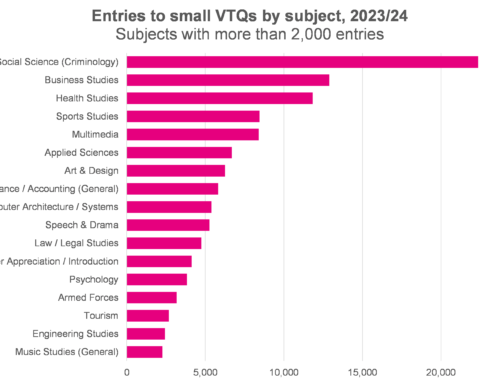
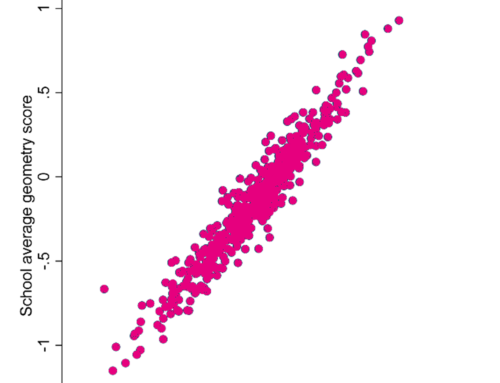
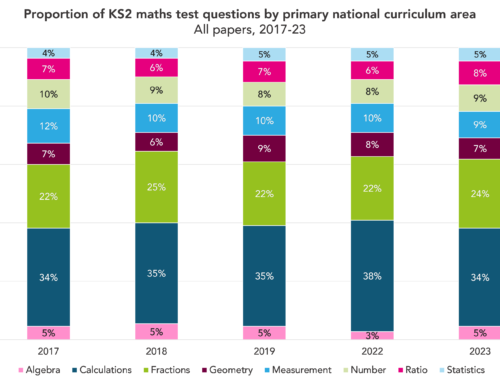
Thank you for this insightful analysis – the sooner EBacc is scrapped the better for the Arts, plus a bit of funding to help headteachers support the material areas would be an obvious reason for uptake. Let’s not forget the coursework (reforms) element too which may also be a factor.
Has edu datalab undertaken any analysis looking at the effect of the EBacc on Triple Science GCSE uptake?
Hi Seren, it’s touched upon in this blogpost: https://ffteducationdatalab.org.uk/2017/03/weird-science/. Hope it’s of some interest
The biggest issue for us is languages. We have several large, high-performing schools where you would expect a good number of pupils to take a foreign language, but their entry rates are really low. (Some of them don’t even enter first language Polish and Urdu speakers for the GCSE, even with a dozen kids in the school!)
For a while, we thought it was just a lag – it takes time to change the curriculum, and if schools haven’t been paying attention to what’s coming up from DfE then they can easily end up a couple of years behind the curve – but we’re well past that excuse now. We’re expecting numbers to be up a bit this year, as the threat of Ofsted looking at their curriculum offer comes in, but it’s still really disappointing how few schools are pushing languages.